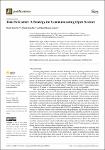Browsing by Author Ho, Manh Toan
Showing results [1 - 5] / 5
This study adopts the bibliometric approach to identify the key characteristics in the relationship of demographic factors (age, gender, affiliations, and locations), scientific productivity, and the collaboration among development economics researchers in Vietnam during the period 2008–2020. Overall, the number of publications and authors in development economics are rising steeply with the average annual growth rate of nearly 23% and 26%, respectively. Moreover, the ‘quality’ of the research appears to be high as 59% of the articles are published in journals in the first and second quartile according Scimago journal ranking. However, the citation counts for these studies indicate th... |
By reviewing regulative documents and extant literature, this paper explores the realities and trends of international students in East and Southeast Asia (ESA). It also shows motivation and strategies of four new players in the international higher education sector in East and Southeast Asia i.e., China, Hong Kong, Taiwan and Malaysia. Apart from showing that intraregional students have not predominated the overall international student population in the region anymore, the paper highlights that ESA region has become an established hub of international students rather than a new emerging destination as it was in previous years. The overall net flow of international students in this r... |
Open access (OA) publishing is beneficial for researchers to improve recognition, representation, and visibility in academia. However, few studies have been conducted for studying the association between gender and OA publishing likelihood. Therefore, the current study explores the impacts of gender-based authorship structures on OA publishing in Vietnamese social sciences and humanities. Bayesian analysis was performed on a dataset of 3122 publications in social sciences and humanities. We found that publications with mixed-gender authorship were most likely to be published under Gold Access terms (26.31–31.65%). In contrast, the likelihood of publications with the solely male or fem... |
Traditionally, students from the Southern world tend to cross their national borders to study abroad. However, in recent times, we have observed a trend in which more and more students, both full-time and short-term, select Southern countries as destinations for overseas education. This paper contributes to the sparse literature on the above phenomenon, examining the case of Vietnam. We surveyed 50 universities and colleges about their international student profiles (including statistics and nationalities) and their strategies for attracting international students. The findings of this study provide implications for Vietnam's policymakers and university/college leaders and other South... |
This paper seeks to introduce a strategy of science communication: Total SciComm or all-out science communication. We proposed that to maximize the outreach and impact, scientists should use different media to communicate different aspects of science, from core ideas to methods. The paper uses an example of a debate surrounding a now-retracted article in the Nature journal, in which open data, preprints, social media, and blogs are being used for a meaningful scientific conversation. The case embodied the central idea of Total SciComm: the scientific community employs every medium to communicate scientific ideas and engages all scientists in the process. |



